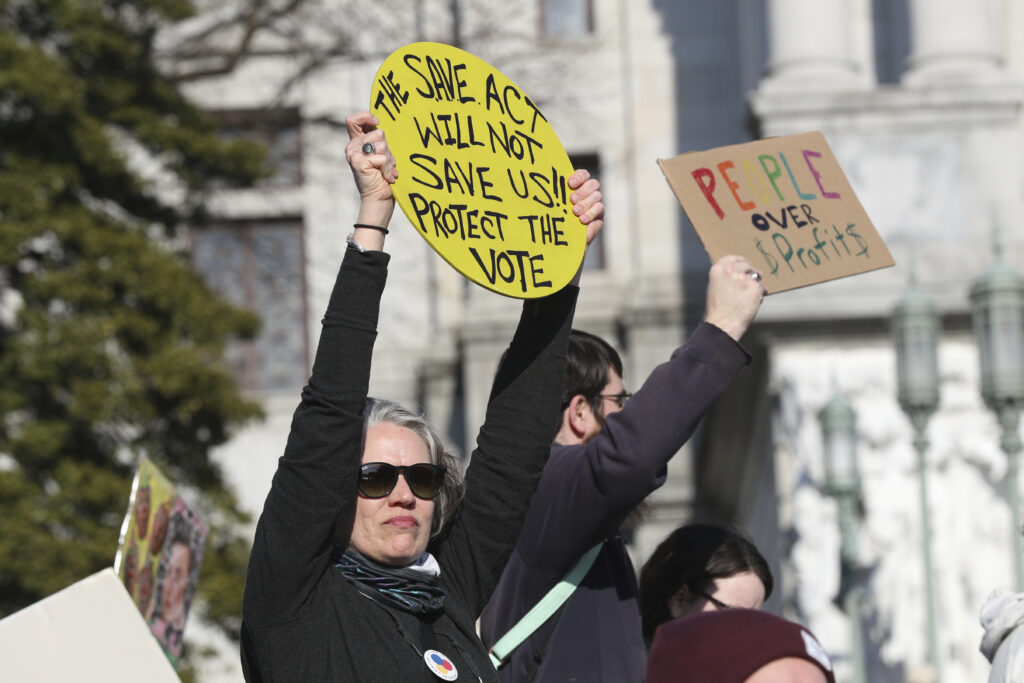The SAVE Act Faces An Uphill Battle. But Some States Want to Impose Similar Measures.

The Safeguard American Voter Eligibility (SAVE) Act — the most extraordinary attack on voting rights in American history — faces a steep uphill battle in the U.S. Senate.
But the more immediate threat to ballot access may be in the states, many of which are trying to pass their own version of the measure — or take similar steps to impose proof of citizenship requirements, potentially disenfranchising a large number of voters.
According to Voting Rights Lab’s voter legislation tracker, there are currently 52 bills introduced in 24 states to impose or expand proof of citizenship requirements. “We’ve been hearing from the President and other members of the administration about their obsession with this lie that noncitizens are casting ballots,” Hannah Fried, the executive director of the nonpartisan voting rights organization All Voting is Local, told Democracy Docket. “That has a trickle down effect. That then leads to state legislatures trying to pass their own laws.”
Lawmakers in Indiana, New Hampshire, Michigan, Missouri, Texas and Utah have advanced anti-voting bills that require some form of strict voter ID and/or proof of citizenship in order to vote. Louisiana and Wyoming are, so far, the only new states this year to enact a proof of citizenship requirement. A similar law in New Hampshire went into effect in November. The Wyoming bill, which became law in March without Gov. Mark Gordon’s (R) signature, requires all voters to show proof of citizenship, along with their Wyoming residency, in order to register to vote. The law, which goes into effect in July, also makes it so that a county clerk can reject a voter’s registration if there’s “any indication” that the person is not a U.S. citizen or Wyoming resident.
Under the SAVE Act and in a number of similar state bills, people will need to show their IDs along with their birth certificates or passport in order to register to vote. But millions of people — particularly the 69 million women who changed their names when they got married — don’t have matching names on their birth certificates and passports and risk being disenfranchised under the SAVE Act and related legislation.
Throughout 2024, President Donald Trump and the GOP were obsessed with noncitizen voting — the idea that noncitizens were voting en masse in federal elections, leading to unprecedented levels of voter fraud. It was, of course, a lie. Not only is it illegal for noncitizens to vote in federal elections, there’s numerous studies and reports that show it very rarely happens.
The state effort to disenfranchise voters by way of voter ID goes beyond legislation. Some state officials are engaging with the Trump administration to get citizenship data via the Department of Homeland Security, the Social Security Administration (SSA) and other federal agencies in order to help purge their voter rolls. In Arizona, county election officials reached out to DHS to get the citizenship information for some 48,000 voters who have not provided proof of citizenship. In April, Alabama Secretary of State Wes Allen (R) called on Congress to share the SSA’s master death index with states to help purge noncitizens from voter rolls and comply with Trump’s anti-voting order.
“Granting states immediate access to this data is crucial,” Allen said in a release.
And in April, Indiana Secretary of State Diego Morales (R) and Attorney General Todd Rokita (R) sued DHS to get citizenship data to comply with Trump’s order.
“We know that under President Trump’s leadership and based on his recent Executive Order, there’s a stronger commitment to the election process,” Morales said in a statement on the lawsuit.
“It’s about the sort of permission structure, the tone that this sets,” Fried said about the ramifications of Trump and the GOP’s obsession with noncitizen voting. “The President himself has talked about requiring voters to show proof of citizenship — and his EO addresses that.”
Another major provision of the SAVE Act is to eliminate mail-in ballot receipt deadlines — meaning that if people mail in their ballots before Election Day, but it doesn’t arrive until after that day, they won’t be counted. There are currently 39 bills in 17 states — every state that accepts mail-in ballots after Election Day, so long as they are postmarked before that day — to completely eliminate these extended deadlines.
Eliminating states from counting ballots that arrive after Election Day has long been one of Trump’s main goals, and one of the central provisions of his anti-voting order. It’s also been the subject of numerous GOP lawsuits — including one in Mississippi that is poised to be decided by the U.S. Supreme Court.
Cumulatively, these attacks on voting rights — from the executive branch, Congress and the state level — have two specific goals, according to Fried: both to make it harder for people to vote and to scare people from voting.
“It contributes to a broader environment of fear for immigrants, for Americans who were once immigrants to this country, who have naturalized, for people who are not white,” she said. “That someone might see you at a voting location, having heard the top officials in this country spewing a bunch of nonsense for the past four years, then take it upon themselves to call you out when you’re at the polling place. This is about fear, and it is about stopping people from voting.”